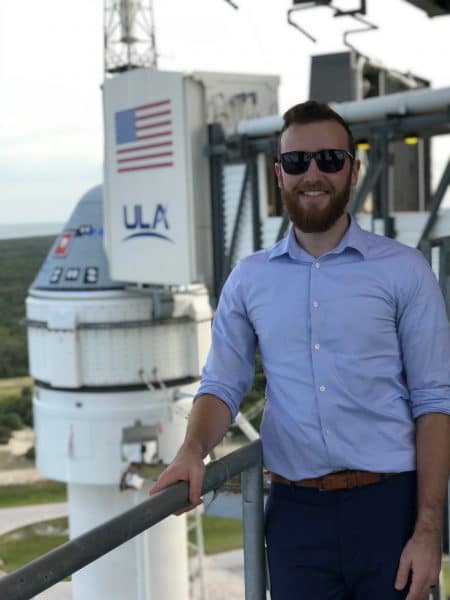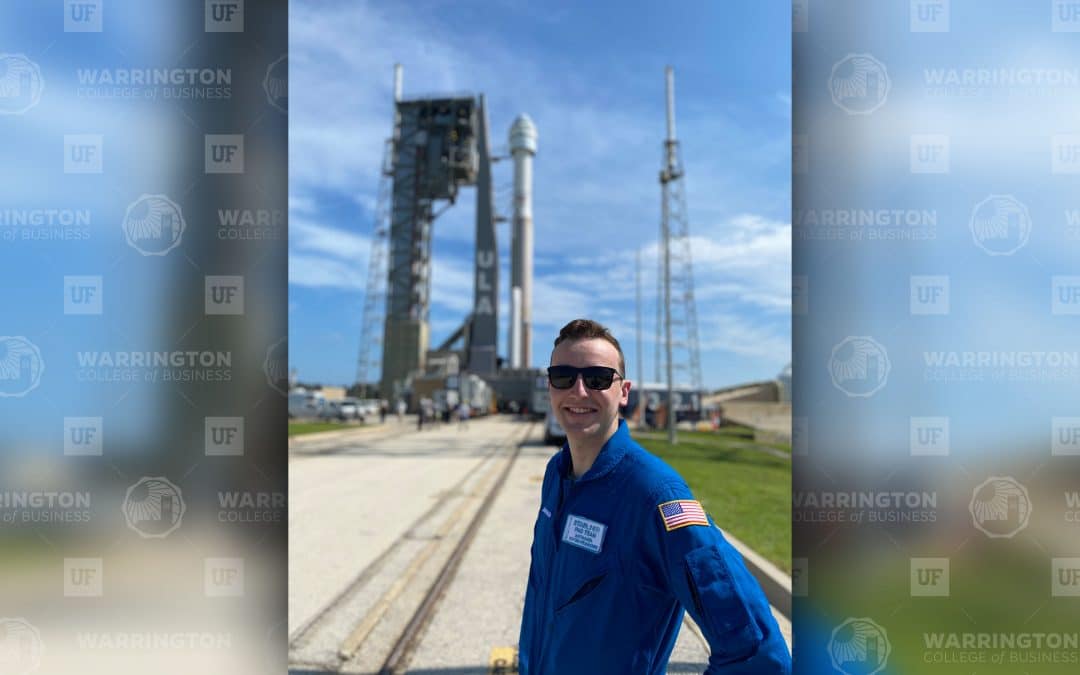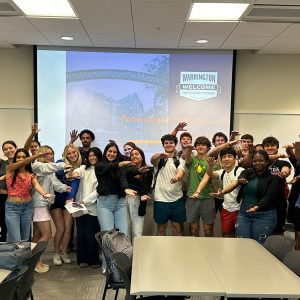Launching into the future of spaceflight
How Nathaniel Keyek-Franssen is using his UF MBA skills to lead a critical team for the Boeing Starliner program.
Nathaniel Keyek-Franssen’s interest in aerospace engineering started when he was a kid, from building model rockets and planes to watching planes at his local airport, and has only grown since then. With years of engineering education and plenty of determination, Keyek-Franssen was able to turn his childhood passion into his career.
Today, Keyek-Franssen (MBA ’22) is the acting manager for Boeing’s Crew Station Transportation (CST)-100 Starliner fluids test team based at Kennedy Space Center.
“The U.S. Space Program is a specific interest that combines the cool factor with the privilege to expand human scientific research in the final frontier,” he said. “My current program transports crew and cargo to and from the International Space Station. Providing a hand in keeping the station crewed so it can continue working on the cutting edge of scientific discovery is an absolute honor.”

Keyek-Franssen’s fluids test team is responsible for performing the acceptance and functional testing of the Starliner’s fluid systems, like propulsion, environmental controls, thermal controls, the landing and recovery system, and even the pressure vessel that make up the crew module.
“My team acts as a gate between the spacecraft build and acceptance for flight,” he described. “It’s our job to find, troubleshoot and remediate issues encountered during the build.”
Keyek-Franssen’s team also plays an important role in mission support. Once the spacecraft is out on the launch pad for integration with United Launch Alliance’s Atlas V rocket, the team is there to help with final checkouts as well as serve as the keepers of dedicated consoles in Boeing’s mission control during the pre-launch countdown. In these situations, Keyek-Franssen is there to make sure his team has all the tools they need to perform their work and help clear any roadblocks that might be in their way.
Thanks to Keyek-Franssen’s time in the UF MBA Online program, he feels well prepared for his managerial role on the fluids test team.
“I joined the UF MBA program because I was interested in the powerful combination an engineering and business education creates,” he said. “Knowing the technical detail behind engineering decisions while holding an understanding of business impacts builds a leader most capable of successfully managing engineering teams.”
When he joined the UF MBA Online program, Keyek-Franssen had two main goals. First, use his education to move into a technical managerial role where he could combine his technical background with business acumen. Second, learn how to speak the language of business.
“My career to date has surrounded me with some of the best and brightest engineers the country has to offer,” he said. “Being able to effectively communicate between this group and program leadership was a skill I was looking for when I started the MBA.”
Keyek-Franssen is proud to say he was able to accomplish both of his goals. With his MBA, he was qualified to apply for technical managerial positions, and ended up in his current role leading the 12-engineer fluids test team, as well as felt prepared to jump into any business meeting that he might be asked to join.
“Working through the program, and especially the heavy focus on economics and financials, I now feel comfortable ‘talking shop’ with the business leaders on my program and within Boeing,” he said.
Interpersonal communication is another skill Keyek-Franssen notes he built in the program that has benefitted his career. Specifically, his courses in professional writing and organizational behavior have given him the tools to effectively communicate in his workplace.
“Coming into the UF MBA program, I had spent my career primarily surrounded by other engineers,” he said. “What I appreciate about the program is how that was turned on its head, as I was now responsible for completing projects with others from much more diverse backgrounds. The opportunity to work with accountants, doctors, and graphic designers was an eye-opening experience and significantly developed my communication and team building skills.”
Keyek-Franssen’s team recently celebrated an accomplishment that has been years in the making – the final un-crewed demonstration flight by the Starliner before its next mission carrying NASA astronauts to and from the International Space Station. The recent UF MBA graduate was able to work on the pre-launch closeout team where he was responsible for carrying out what will be the actions of the flight crew on future launches.
“I had to keep pinching myself when working inside the crew module on a fully-fueled rocket shortly before launch,” he recalled. “Knowing my teammate and I were the last ones inside the Starliner before launching is an absolute dream come true and probably the closest to being an astronaut that I’ll ever become!”
Even with a successful launch under their belt, the team encountered plenty of challenges along the way, one which came with a powerful lesson for Keyek-Franssen.
“There’s really only one way to put it, space is hard,” he said. “Especially human spaceflight. The biggest challenge I faced on the program isn’t a purely technical one. It’s been about having grit and determination to overcome those challenges and keeping a positive outlook even when there are negative perceptions, opinions and news stories out there. My patience and passion for the mission have kept me going through the years and are now paying off as the Starliner has reached the light at the end of the tunnel.”
Keyek-Franssen is looking forward to leading his team into the Starliner’s planned long-duration missions, especially now that he’s gained the business acumen to help him succeed in a managerial role.
“The UF MBA program has provided me with a stronger capability in strategic decision making that has been crucial in my new role,” he said. “I’ve learned through the program that you’ll likely never have 100% of the information that you’d like to have in order to make a strategic decision. It’s often better to make a decision with 80% of the information available and rely on judgement from past experience to make up for the missing information, rather than becoming paralyzed and spinning wheels for perfection.”




